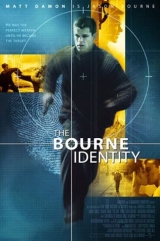
Jason Bourne is pulled from the sea by a passing fishing vessel, with no knowledge of who he is, or how he came to drift alone in open water. The bullets in his back and the bank code embedded in his hip are the only bits of information to survive his identity loss. Bourne must evade his pursuers, while slowly piecing together what few clues he can find that help uncover memories of his secret life as a government assassin.
Neuropsychological Review
An action packed "Who Am I?"
Joesph Hengoed
“Who am I?”- Jason Bourne
Jason Bourne, trained CIA assassin, is found floating in the Mediterranean Sea with two bullets in his back and no memory of who he is or where he came from. Jason is experiencing a complete loss of identity and complete retrograde amnesia, or the loss of his memories before the accident. Jason’s amnesia may be due to
“How could I forget about you? You’re the only person I know.” – Jason Bourne.
Although cinematically popular for the main character to lose his memories via retrograde amnesia, this is not what usually happens in actual cases of brain damage (Baxendale, 2004). The most common form of amnesia after a traumatic brain injury is anterograde amnesia, which is the inability to form new memories. In severe cases of retrograde amnesia such as Jason Bourne’s, where his memory loss extends decades, there is usually an accompaniment of equally strong presence of anterograde amnesia (Lezak et al., 2012).
Statistically speaking, Jason’s accident should have caused him anterograde amnesia with the possibility of a less severe temporally graded retrograde amnesia. Yet, it is not impossible to experience retrograde amnesia alone as in Jason Bourne’s case, and it is referred to as focal or isolated retrograde amnesia. Interestingly, damage to the medial temporal lobes, which is associated with anterograde amnesia is not associated with isolated retrograde amnesia. Multiple damage sites including the anterior temporal lobes, frontal lobes, and posterior regions (Levine et al., 1998) are related to retrograde amnesia. Because Jason was able to form new memories of the places he’d been and the new people he had met (either his new love interest Marie or other agents out get him), Jason shows the traits of isolated retrograde amnesia without any anterograde impairments. However, even with severe retrograde amnesia for events of one’s life, losing identity would not be expected.
“The knots like everything else, I just found the rope and I did it. The same way I can, I can read, I can write. I can add, subtract. I can make coffee. I can shuffle cards.”- Jason Bourne.
An interestingly component of Jason’s memory impairment is that previously learned general knowledge and his procedural memory are still intact. Procedural memory is the “how to” of performing either physical or cognitive tasks. Just like riding a bike, Jason Bourne finds that he can do things without any recollection of learning. Jason finds that he can speak foreign languages fluently, perform advanced martial arts, and other traits that an assassin would have but he has no recollection of learning any of these skills. This is in line with what would be expected with any type of amnesia. Old learned skills memories have been shown to remain intact in individuals with retrograde amnesia (Ewert et al., 1989). Also new procedural skills can be learned.
Overall, this action packed thriller is extremely entertaining,and Jason’s amnesia only plays a minor role in supplementing the exciting car chases and awesome fight scenes. In clichéd style, Jason’s amnesia is portrayed as complete identity loss and consists solely of retrograde amnesia. In the rare cases of loss of identity, these are associated with psychogenic disorders related to sever emotional trauma rather than neurologic disorders. If Jason suffered a physically brain injury related to hitting his head after being shot (although the movie doesn’t make this explicit), it would have been uncommon for Jason to solely have retrograde amnesia and not have any anterograde impairments. As an educational tool, The Bourne Identity could be used to introduce the basic neuropsychological concept of amnesia to students as well as to give a typical example of how neurologic amnesia is misportrayed.
References
Baxendale, S. (2004). Memories aren’t made of this: Amnesia at the movies. BMJ: British Medical Journal, 329, 1480-1483.
Cruz, R. (2010). Traumatic brain injury. Oxford American Handbook of Physical Medicine & Rehabilitation, 321.
Ewert, J., Levin, H. S., Watson, M. G., & Kalisky, Z. (1989). Procedural memory during posttraumatic amnesia in survivors of severe closed head injury: Implications for rehabilation. Archives of Neurology, 46(8), 911.
Levine, B., Black, S. E., Cabeza, R., Sinden, M., McIntosh, A. R., Toth, J. P…& Stuss, D. T. (1998). Episodic memory and the self in a case of isolated retrograde amnesia. Brain, 121(10), 1951-1973.
Lezak, M. D., Howieson, D. B., Bigler, E. D., & Tranel, D. (2012). Neuropsychological assessment. New York: Oxyford University Press, Inc.
Nadel, L., & Moscovitch, M. (1997). Memory consolidation, retrograde amnesia, and the hippocampal complex. Current Opinion in Neurobiology, 7(2), 217-227.

 RSS Feed
RSS Feed

